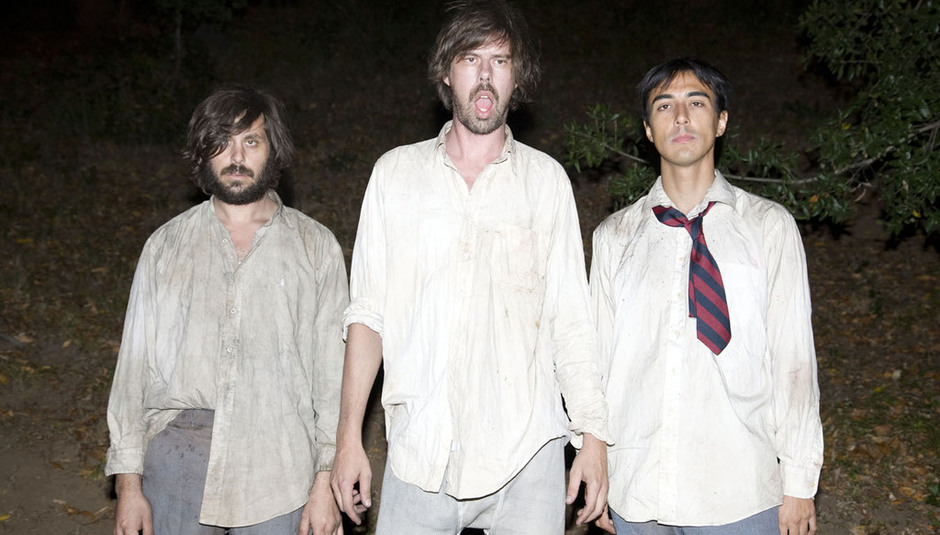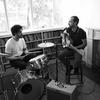Following the straight down the line thrills of their Berlin-wrought fourth album Liars, Angus Andrew, Aaron Hemphill and Julian Goss moved to LA for a year to make its follow up, Sisterworld. Here is its story, told by the genial trio themselves.
DiS: The publicity talks a lot about the importance of recording Sisterworld in LA; did you make it there because you felt it would help you make a certain type of record, or did LA kind of impose itself on you as you went along?
Angus Andrew: Yeah, it’s more the latter, because we’ve been in Berlin the last two records, kind of braving the elements in a way. It was kind of decided before we thought about the record that we would go to LA where these guys [Hemphill and Gross] are from, sort of like coming home in a way, so that it would be a much more receptive environment to our needs. Because in Germany we were dealing with the language and just the whole thing was kind of about being isolated; LA was about being able to utilise a lot more elements, and once we were there then things... developed.
DiS: Yeah, it sounds like you personally had shacked up somewhere not so great.
AA: Yeah, I mean it’s interesting because you know, LA... there’s so many angles to it and I think what we wanted to do was uncover some of the ones that aren’t often talked about.
DiS: So were you living where you were living as a form of research?
AA: Yeah! Well, part of the reason is that it was midway between these guys’ houses, they live on opposite sides of town and I’m sort of in the middle and that worked. But generally the idea was to sink my teeth into somewhere where I could get an idea of what was going on.
DiS: So what was your neighbourhood like?
AA: Um, really kind of normal, where a lot of people drive through, but not necessarily spend a lot of time in, it looked very okay, it didn’t look scary, but sort of when the sun goes down everything looks quite different. A steady flow of homeless people and gangster people is pretty much what I saw a lot of.
DiS: And ‘Scarecrows on a Killer Slant’ is based on a shooting that happened on your doorstep – was that a homeless person, as the lyrics sort of imply?
AA: No, it was a guy who was trying to steal from a medical marijuana dispensary, which is actually what I was living above.
DiS: Wow.
AA: Yeah. But it was actually the security guard of the place that got shot.
DiS: Fatally?
AA: Yeah. Pretty nasty. So yeah you know, there was stuff going on, but it was all ideas for the project, you know?
DiS: Is LA something pretty different to the rest of the band?
Aaron Hemphill: It’s nice garden, beaches, spread out bigger than any other place I’ve ever been to.
Julian Gross: I think in LA you have to know more about yourself and what you want, otherwise you’re going to be severely disappointed, you’re going to be stuck somewhere. It’s not like New York, where you just stumble about and you find a scene, you have to know where it is. I find that’s very appealing, because it kind of separates the crap, like I know exactly what I need and I know where to get it and it feels like my secret city, even though it’s not.
AA: It’s just in general, I think that happens anywhere we are, I think we all had different impressions of what Berlin was like. I think one of the things that I think’s difficult about LA for anyone is that it’s supposed to be this great city, but it’s really hard to figure out where that city actually is; because geographically it doesn’t work like a city, you know?
Video: Liars: 'Scissor'
DiS: Who is Tom Biller? He’s co-credited with Liars as maker of Sisterworld, but I don’t get the impression he plays or produces?
AA: He’s more like an enabler for us, he knows a lot of people in LA and could get us around and into a lot of places we wanted to go to, which was important. We wanted to try recording in lots of different spaces. It all goes back to this ideal of being in LA and utilising the possibilities. Different people, houses, studios, bedrooms, and then string players, all these types of musicans... things were there, available to us much more than ever. It was amazing.
DiS: So would you be kind of like ‘bring me horn players’?
AH: Ah, no finger snapping. Tom has the network that we might have had if we didn’t travel so much. So we’re like ‘do you know a horn player? We could try some horns here.’
DiS: Does it take confidence that you previously lacked to bring in those extra players?
AA: I think so, it was pretty surprising, almost, that we were in agreeance at going down that step. It also had to do with the amount of time we had to make the record, we could make a song and then think about it: ‘this song’s okay, but what else can we do with it?’ And I think we learned a lot from the last album Liars, it was pretty telling for us about the way we work or don’t work, like ‘should the record be a bigger thing than just a bunch of songs?’ I think that’s something we were battling with after Drum’s Not Dead.
DiS: How do you feel about Liars now? When I interviewed you about it a couple of years back you seemed utterly delighted by now ‘normal’ it was.
AA: I really was excited about that idea of keeping it really even keel, but in the end I think after thinking about making records it’s just that much more interesting to develop an identity around a record, an experience.
DiS: Do you see Sisterworld as having a sonic identity? I’ve been calling it ‘sickly’ to people...
AA: Yeah. I think just sonically or mood-wise Aaron and I talked about something dark or something uncomfortable, this idea that we felt unsure of how we relate to a lot of the music we hear nowadays or what’s going on... I dunno, the idea of 'fake positivity', it instructed us early on that we wanted to make something fairly grim.
DiS: Is it emotionally gruelling making challenging music?
AA: I definitely felt a bit fucked up after I recorded a bunch of stuff and listened back to it, I thought ‘oh God, I’m really quite dark’. I felt very uncomfortable playing it to someone, because I felt like I was a really dark person.
DiS: Do you think you’re not?
AA: I think when you allow yourself to go into that form of thinking then you can go a bit that way, but then obviously it can be a good form of release.
DiS: Does the associated Sisterworld imagery - ie the elaborate packaging, the videos at thesisterworld.com - tie in with the music or lyrics at all?
AA; No, I think the hope is that it’s not too defined, that the record isn’t a Sisterworld, but the feeling that makes you want to find a Sisterworld, and that could be anything, whether it’s a mental space or a digital space or a physical space: it’s possible for it to be any. But we were keen on not trying to make it too specific.
DiS: Why did you decide to package it with a CD of remixes?
AA: There was some point when the label said ‘well what’s the single, what’s the b-side, do you want some remixes when that comes up?’ But also we were doing this elaborate packaging, so could we include anything else in that that would make it a worthwhile, economic venture? When those two things came up we started to look into the possibilities.
DiS: And what you’ve done is given artist’s tracks and said ‘just do whatever, it doesn't have to be remix per se’...
AA: Yeah, more of a cover or reinterpretation. It’s tricky because the idea of a remix has become really stunted or stale, five remixes of one song, and I think also the idea of who does them too. So maybe it’ll be more interesting to get Throbbing Gristle to do a remix than DJ whoever, so maybe that is what we were trying to do, open up the genre a bit more.
DiS: Would it be weird to you if somebody buys the double disc set and then, you know, the Thom Yorke version of 'Proud Achievers' becomes the definitive version to them?
AA: Well that’s what’s happened in some senses; Devendra Banhart’s done a cover of one of the songs ['The Overachievers'] and when I think of it I think of his version so yeah, I think that’s kind of interesting, hopefully that happens, it’s good because it makes a sort of ongoing experience.
DiS: Did you basically let them do anything?
JG: Oh yeah, like Buzzo [from the Melvins] phoned to see what we wanted and we were like ‘anything, seriously, put your kid crying for three minutes there, whatever you want. He was like [delighted] ”really?”. I think it made them think excited to know there were no restriction we wouldn’t be going through it with red pen or saying ‘hmm, not Melvinsy enough'.
DiS: Are there big expectations for Sisterworld? The remix album, packaging etc suggests maybe there is.
AA: No, it’s because we’re getting a little better at being organised I think and thinking about what we want, further in advance. I mean we did Drum’s Not Dead kind of elaborately, with the videos for each song, but certainly with the packaging and artwork we were on the same page together from early on, and because we were all living in LA it meant we were that much more in communication about what should happen.
Video: Liars: 'We Fenced Other Gardens With The Bones of Our Own'
DiS: Are you surprised you’ve made it this far as a band?
AA: Yeah, it’s amazing. Who would have thought? We’ve never had a very peak and trough career... though I think there was a very heavy negative reaction to our second record [They Were Wrong, So We Drowned], which was really good for us in the end, that record’s really important to us. It’s got a lot to do with Mute as well, they’re a good label, they’ve really allowed us to do what we want.
DiS: Finally, how do you look back on Drum’s Not Dead these days? I guess a lot of people see it as your ‘classic’ album.
AA: It’s a pretty popular one...
AH: When we made that we were unsure, we didn’t think ‘this will be considered our best work’.
AA: I think we probably said that about the one before
AH: Somebody asked me was our best record and I said Sisterworld, but I accidentally said it was my 'favourite' and quickly corrected myself, I said Drowned... was my favourite. But it has so little to do with the album. I would say that was the toughest record to make for a number of reasons. But it’s never going to line up. The song you think the crowd will love the best and live no one says anything; the song you slapped together is the favourite of the live show. I dunno. Sensitivity to that on our part is really important.
DiS: You can always break out a Nirvana cover.
AA: [laughs] That we can.
Sisterworld is out now via Mute Records. For more Liars takeover week content, click me.






















